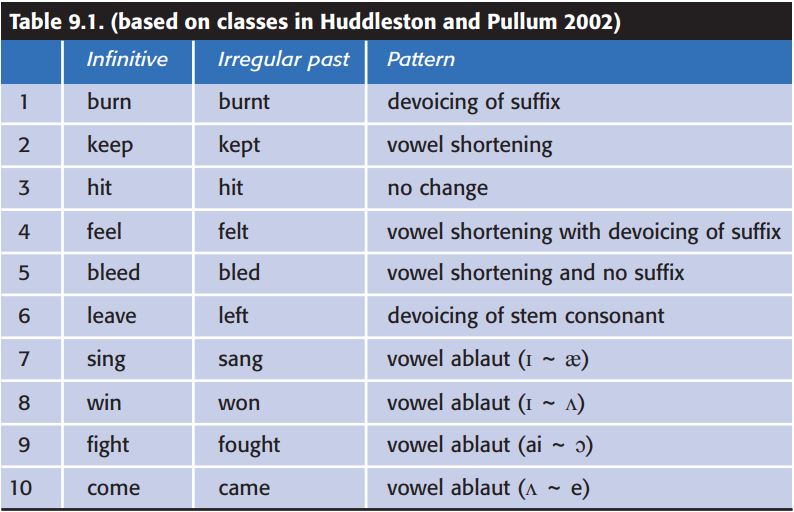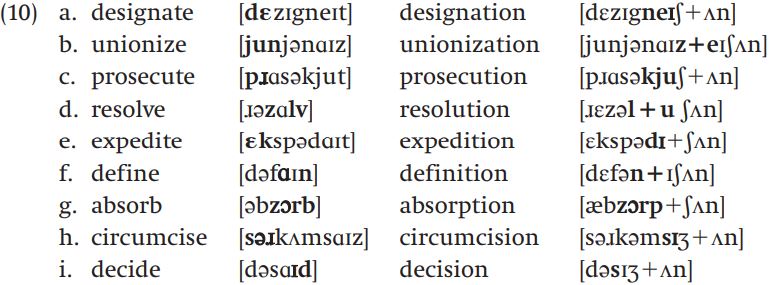

Grammar


Tenses


Present

Present Simple

Present Continuous

Present Perfect

Present Perfect Continuous


Past

Past Simple

Past Continuous

Past Perfect

Past Perfect Continuous


Future

Future Simple

Future Continuous

Future Perfect

Future Perfect Continuous


Parts Of Speech


Nouns

Countable and uncountable nouns

Verbal nouns

Singular and Plural nouns

Proper nouns

Nouns gender

Nouns definition

Concrete nouns

Abstract nouns

Common nouns

Collective nouns

Definition Of Nouns

Animate and Inanimate nouns

Nouns


Verbs

Stative and dynamic verbs

Finite and nonfinite verbs

To be verbs

Transitive and intransitive verbs

Auxiliary verbs

Modal verbs

Regular and irregular verbs

Action verbs

Verbs


Adverbs

Relative adverbs

Interrogative adverbs

Adverbs of time

Adverbs of place

Adverbs of reason

Adverbs of quantity

Adverbs of manner

Adverbs of frequency

Adverbs of affirmation

Adverbs


Adjectives

Quantitative adjective

Proper adjective

Possessive adjective

Numeral adjective

Interrogative adjective

Distributive adjective

Descriptive adjective

Demonstrative adjective


Pronouns

Subject pronoun

Relative pronoun

Reflexive pronoun

Reciprocal pronoun

Possessive pronoun

Personal pronoun

Interrogative pronoun

Indefinite pronoun

Emphatic pronoun

Distributive pronoun

Demonstrative pronoun

Pronouns


Pre Position


Preposition by function

Time preposition

Reason preposition

Possession preposition

Place preposition

Phrases preposition

Origin preposition

Measure preposition

Direction preposition

Contrast preposition

Agent preposition


Preposition by construction

Simple preposition

Phrase preposition

Double preposition

Compound preposition

prepositions


Conjunctions

Subordinating conjunction

Correlative conjunction

Coordinating conjunction

Conjunctive adverbs

conjunctions


Interjections

Express calling interjection

Phrases

Sentences

Clauses

Part of Speech


Grammar Rules

Passive and Active

Preference

Requests and offers

wishes

Be used to

Some and any

Could have done

Describing people

Giving advices

Possession

Comparative and superlative

Giving Reason

Making Suggestions

Apologizing

Forming questions

Since and for

Directions

Obligation

Adverbials

invitation

Articles

Imaginary condition

Zero conditional

First conditional

Second conditional

Third conditional

Reported speech

Demonstratives

Determiners

Direct and Indirect speech


Linguistics

Phonetics

Phonology

Linguistics fields

Syntax

Morphology

Semantics

pragmatics

History

Writing

Grammar

Phonetics and Phonology

Semiotics


Reading Comprehension

Elementary

Intermediate

Advanced


Teaching Methods

Teaching Strategies

Assessment
Unpredictable or partially predictable allomorphy
المؤلف:
Rochelle Lieber
المصدر:
Introducing Morphology
الجزء والصفحة:
163-9
25-1-2022
4410
Unpredictable or partially predictable allomorphy
As we’ve seen above, some allomorphy is regular enough to be captured by phonological rules. But not all allomorphy is regular. Take, for example, past tenses of verbs in English. We have already looked at the regular past tense. Every native speaker or student of English knows that there are also quite a few verbs that don’t form the past tense by adding -ed. Consider table 9.1, which gives a selection of examples.

When we discussed the mental lexicon, we suggested that irregular past tense allomorphs are simply stored in the mental lexicon, and not derived by rules. So speakers of English have a lexical entry for the verb root sing, and along with it an associated entry for past tense sang. It is possible, though, that things are a bit more complicated. Think back to the experiment in section 6.3 where you asked a number of friends to make the past tense of the hypothetical verb gling. Probably a significant number of them offered either glang or glung. Since
this is not a real verb, clearly they didn’t have a past tense stored for it. Rather, they must have been making use of some sort of pattern to create these forms. In English there happen to be quite a few verbs whose present and past tenses show the same ɪ ~ æ alternation as sing or the ɪ ~ ʌ alternation of win. There appears to be an abstract pattern that speakers are tapping into here that relates a present tense with [ɪ] to a past tense with [æ] or [ʌ] if the verb ends in a nasal or a nasal plus some other consonant (for example, like swim, ring, sting, win, stink). Psycholinguists continue to work towards figuring out the exact nature of such patterns.
The example of unpredictable allomorphy we looked at above concerns English inflection. Let’s look at another example that has to do with derivation. Consider the forms in (10):

All of the verbs in the lefthand column have noun forms with the suffix -tion. But if you compare the transcriptions of the verbs and nouns carefully, you will see that both the verb bases and the derivational affix have various allomorphs. For example, the suffix seems to be -ʌn in (10a and c) but -eɪʃʌn in (10b). It looks like -uʃʌn in (10d), but -ɪʃʌn in (10f), and -ʃʌn in (10g). In (10a, c, and e) the [t] at the end of designate, prosecute, and expedite seem to have changed to [ʃ], the [v] at the end of resolve seems to have disappeared, and the [b] at the end of absorb has changed to [p]. And if you look carefully at many of these forms, the stress pattern on the derived noun is different from that of its verb base (the stressed syllable is shown in boldface). In other words, there is quite a complicated pattern of allomorphy associated with this suffix.
Is it predictable? Parts of it are. For example, if a verb ends in [v] and has a derived noun with the -tion suffix, it will always lose its [v] and the suffix will be pronounced -ution (think about the derived nouns for dissolve, absolve, revolve, etc.). Similarly, if a verb ends in [t] and takes the -ion suffix, the [t] will become [ʃ]. And if a verb ends in [z] or [d] and takes the -tion suffix, those consonants will become [ʒ]. Since the sounds [ʃ] and [ʒ] are palatal sounds, this process is called palatalization.
But the choice of allomorphs is not entirely predictable. For example, it’s not clear if we can predict when we will get -ation, say, as opposed to -ion on a particular verb base: we find -ation on the verbs unionize and refute, but not in circumcise and prosecute; those have the -ion allomorph. The derived noun form from combust is combustion, but that of infest is infestation. Why not combustation and infestion instead? The verb base propose yields proposition, but accuse yields accusation. Why not proposation, or accusition? To some extent the choice of allomorphs seems to be quite arbitrary.
 الاكثر قراءة في Morphology
الاكثر قراءة في Morphology
 اخر الاخبار
اخر الاخبار
اخبار العتبة العباسية المقدسة

الآخبار الصحية















 قسم الشؤون الفكرية يصدر كتاباً يوثق تاريخ السدانة في العتبة العباسية المقدسة
قسم الشؤون الفكرية يصدر كتاباً يوثق تاريخ السدانة في العتبة العباسية المقدسة "المهمة".. إصدار قصصي يوثّق القصص الفائزة في مسابقة فتوى الدفاع المقدسة للقصة القصيرة
"المهمة".. إصدار قصصي يوثّق القصص الفائزة في مسابقة فتوى الدفاع المقدسة للقصة القصيرة (نوافذ).. إصدار أدبي يوثق القصص الفائزة في مسابقة الإمام العسكري (عليه السلام)
(نوافذ).. إصدار أدبي يوثق القصص الفائزة في مسابقة الإمام العسكري (عليه السلام)


















